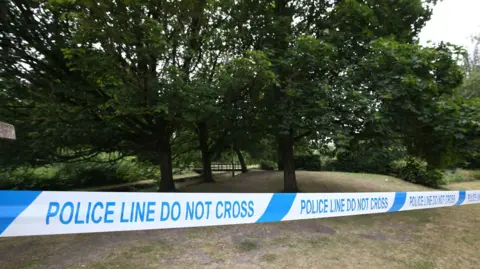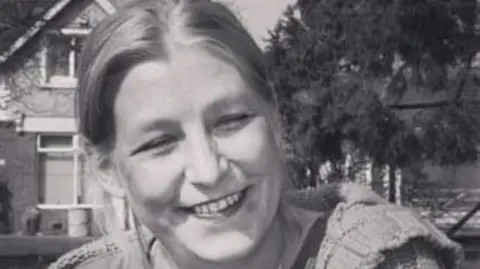Some Novichok advice not issued until after death
 PA Media
PA MediaAdvice warning people not to pick up discarded containers after a woman was poisoned by a nerve agent was not issued until more than a week after she died, an inquiry into her death has heard.
Dawn Sturgess came into contact with Novichok through a perfume bottle it had been hidden in four months after a former Russian spy was poisoned with it in Salisbury in 2018. She died eight days after she was poisoned.
The country's most senior counter-terror police officer said the risk of a discarded bottle was on the minds of investigators.
However, a chief adviser to the Home Office said that no public health changes would have made a difference to what happened. The inquiry continues.
 Caroline Sturgess
Caroline SturgessThe public inquiry has been examining whether more could have been done to warn people in Salisbury about the risk of finding the nerve agent.
Commander Dominic Murphy, head of the Metropolitan Police’s Counter Terrorism Command, said it was "reasonable to say there was an ongoing risk".
There was a long period of time after the nerve agent attacks that areas of Salisbury were closed off.
People in the city and in Amesbury were given advice to not pick up something unless it was them who dropped it.
Activities such volunteer litter-picking were halted as a result.
However, this particular warning was not issued until after Ms Sturgess had died from the nerve agent.
The mother-of-three collapsed after opening the bottle on 30 June. She died on 8 July.
Commander Murphy explained that they had "made it clear had we not found Novichok, we were always concerned it was still there".
However, there was not a specific conversation with Public Health England on this.
A key witness for Public Health England was unwell on Monday, but the inquiry did hear from Professor Sir John Aston, chief scientific adviser at the Home Office.
He was in some of the key meetings at the time and, when challenged during the inquiry, acknowledged there was a risk of causing panic if a warning was put out about a discarded contained if there were not concrete facts.
He led a review into lessons learned, finding there could have been better communication between public health staff and counter-terror police.
In that report, however, Sir John said no mistakes were made in terms of public health that would have made any material difference to what happened.
He did warn that there was a need to be "careful about the fact that Novichok was found" because it did not "necessarily imply that the risk was high that it would be found".
"We have to be careful that we don't flip the timing in order to change what we believe the risk actually was," he said.
The witness for public health will appear at a later date, but the inquiry is now due to focus on the poisoning suspects and how they were traced.

BBC Sounds: Salisbury Poisonings
Keep up to date with the latest from the inquiry with our podcast.
Listen to the episode on BBC Sounds.

Follow BBC Wiltshire on Facebook, X and Instagram. Send your story ideas to us on email or via WhatsApp on 0800 313 4630.
